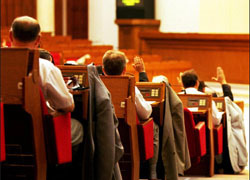Lukashenka’s “chamber” not allowed joining PACE so far
32- 23.06.2009, 13:31

The Special Guest Status at the Parliamentary Assembly of the Council of Europe will be restored for the Belarusian “parliament” for a year only after a moratorium on the execution of the death penalty is decreed.
The discussion on the Belarusian issue started at the session with the speech of the PACE Rapporteur on Belarus Andrea Rigoni. He presented the report and the draft resolution envisaging restoration of the Special Guest Status for the Belarusian parliament.
At the debate which took place after that, the First Vice-Chairperson of the PACE Committee on Committee on Legal Affairs and Human Rights Christos Pourgourides offered to return the Special Guest Status for Belarus only after a moratorium on the execution of the death penalty is decreed in the country, the BelaPAN informs.
Speaking about the importance of the moratorium on capital punishment, Pourgourides underlined: “People are shot in Belarus, and families of the executed are not given their bodies and not informed about the place of burial”.
As said by him, “major efforts are still needed” before granting the Special Guest Status to the Belarusian “parliament”.
“Many wrong things are taking place in Belarus. Granting the status, we should lay down certain conditions to Belarusian authorities,” Pourgourides is convinced.
The majority of the PACE deputies have voted in favour of this amendment to the resolution.
It is stated in the resolution: “Considering that Belarus is far from the Council of Europe’s standards in the sphere of democracy, rule of law and human rights, but at the same time the authorities have undertaken measures that were important steps in the right direction”, the Assembly decided to urge the country to continue this process by establishing a political dialogue with the authorities, at the same time contributing to strengthening of the democratic forces and the civil society in the country.
It was also noted that “in recent months, important developments have taken place in Belarus: between January and August 2008, nine opposition figures considered as political prisoners were released, including former presidential candidate Alyaksandr Kazulin… The Parliamentary Assembly welcomes this tangible progress and calls for it to be made irreversible,” the resolution reads.
Among other positive steps of Minsk the registration of the opposition movement For Freedom!, as well as the possibility for independent media outlets – Narodnaya Volya and Nasha Niva – to be published in Belarus and their inclusion in the state distribution network are mentioned. Besides, the Assembly takes note of the resignations handed over, in April 2009, by Uladzimir Naumau, Minister of the Interior since 2000, who was considered involved in the disappearances of four political opponents in the years 1999-2000.
“What adds to the importance of these developments is that they respond to precise demands coming from European organisations, and that they have been undertaken in the context of the resumption of political dialogue with the Belarusian leadership,” the resolution emphasizes.
“Despite recent positive developments, however, and the resumption of contacts with European organisations, the situation in Belarus continues to be a cause for concern,” the document reads.
In particular, “the parliamentary elections of September 2008 were a missed opportunity for a decisive change towards democracy, as they failed to meet European standards of freedom and fairness… Harassment and intimidation of opposition activists, in particular youth, continue to take place through various means, political and human rights organisations still encounter difficulties when registering, journalists from independent and foreign media encounter difficulties in obtaining press accreditation.
The PACE called upon the authorities to allow the Secretary General of the Council of Europe to instruct a panel of independent experts with the task of investigating the case of Vaukavysk businessmen and ascertain whether they are political prisoners, according to the precise criteria already established by the Council of Europe. If so, they should be freed.
Besides, the Assembly calls on the Belarusian authorities to erase the criminal record of former political prisoners, in order to enable them fully to exercise their civil and political rights; refrain from the harassment and intimidation of opposition activists; discontinue the practice of forced conscription of opposition activists into the military service despite previous declarations of being unfit for service; allow the registration of the human rights organisation Nasha Viasna; to ensure the respect of freedom of association, of freedom of assembly, freedom of expression; reform the electoral legislation and practice by taking into account the recommendations of the OSCE/ODIHR and the European Commission for Democracy Through Law (Venice Commission).
It is stated in the resolution that “until the opposition is adequately represented” in the Belarusian parliament, “a delegation of the Belarusian extra-parliamentary opposition is to be invited to every Assembly session as well as every time that the issue of Belarus appears on the agenda of the Assembly’s committees”.
In the light of these factors, the Assembly considers that the lifting of the suspension should be accompanied by monitoring of the situation to assess whether the country is making "substantive and irreversible" progress towards Council of Europe standards.
PACE granted the Belarusian Parliament Special Guest status in 1992. In the absence of progress in the areas of democracy, human rights and the rule of law, this status was suspended in 1997 following a Constitutional referendum in 1996 which increased powers of the president. After the referendum Belarus’ application to join the Council of Europe was frozen, and it remains the only European country that is not a member of the Organisation. Since that time the Belarusian authorities made numerous attempts to return to Strasbourg.
“The parliamentary election” held in Belarus in autumn 2008 was recognized by the international community as not free and not fair.










